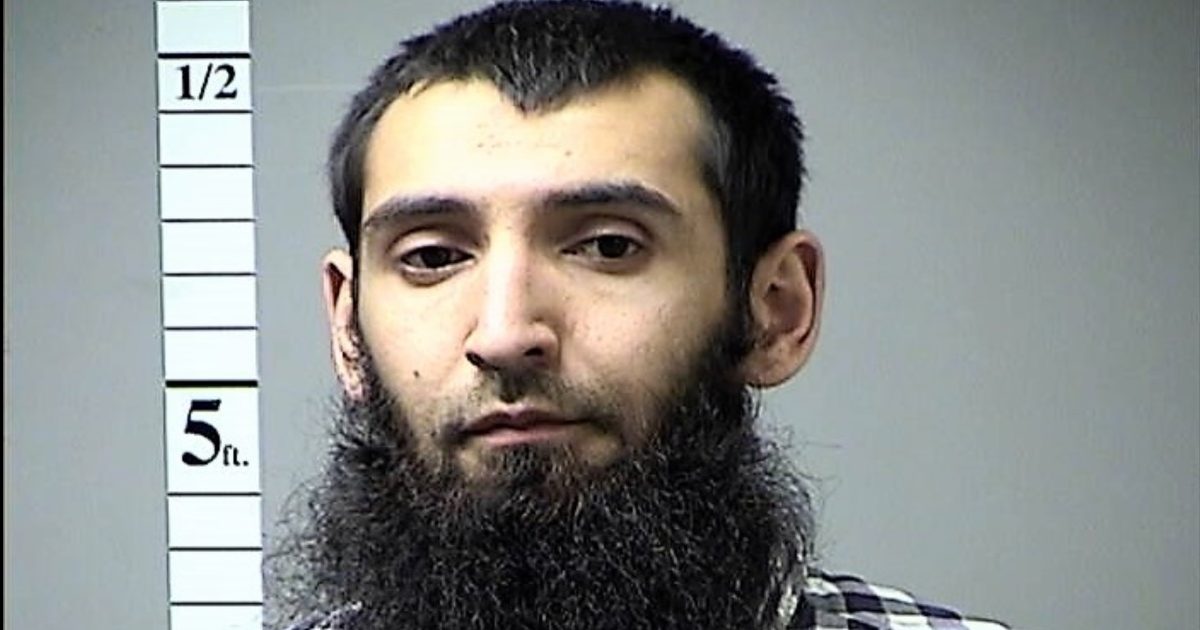
Sayfullo Saipov (Image via Mugshot Handout/Getty Images.)
Convicted New York City truck attack terrorist Sayfullo Saipov escaped the death penalty on Monday after a jury failed to reach a unanimous verdict, as Empire State juries maintain their longstanding tradition against capital punishment.
More than half a century has passed since a federal jury in New York sentenced a defendant to die. Monday’s development means that record stands.
The jury split is unclear from the verdict form. Jurors agreed unanimously on most of the aggravating factors, save for one — splitting on whether they believed Saipov would commit criminal acts of violence in prison in the future.
They also largely agreed on the mitigating factors: namely, that Saipov already will be in prison for life and has been spending 22 hours a day alone in his cell in the H Unit of ADX prison.
On Halloween 2017, Saipov intentionally drove a rental truck off the West Side Highway onto a bicycle and pedestrian greenway, killing eight people and wounding 12. The Home Depot truck stopped after crashing into a special-needs school bus.
A wealth of evidence, including Saipov’s own words, connected the defendant to the crime, but the penalty phase of trial would determine whether a New York jury would find he should be executed, despite the deep-blue state’s longstanding aversion to the death penalty.
New York abolished the death penalty in 2004, but capital punishment is still available in federal courts, where Saipov had been tried.
Despite his professed reservations about the death penalty, Attorney General Merrick Garland’s Justice Department asked a jury to vote for the death of Saipov, whose case began during the Donald Trump presidency. Garland imposed a moratorium on the death penalty in July 2021, pending what he described as a review of the department’s “policies and procedures.” His office nonetheless pursued Saipov’s execution years after that announcement.
“The Department of Justice must ensure that everyone in the federal criminal justice system is not only afforded the rights guaranteed by the Constitution and laws of the United States, but is also treated fairly and humanely. That obligation has special force in capital cases,” Garland wrote in a two-page memorandum. “Serious concerns have been raised about the continued use of the death penalty across the country, including arbitrariness in its application, disparate impact on people of color, and the troubling number of exonerations in capital and other serious cases.”
In opening statements of the penalty phase, Assistant U.S. Attorney Amanda Leigh Houle told a jury that the torment of Saipov’s victims cries out for nothing less.
“Their minds are still haunted, terrorized by facing death and watching others die. And this was all part of the defendant’s plan,” Houle said, adding that Saipov “has not abandoned his jihad, his fight.”
As he got out of the truck, Saipov was heard shouting “Allahu akbar,” Arabic for “God is great.” Law enforcement shot him at the scene, before taking him to Bellevue Hospital for medical treatment. There, authorities say, Saipov asked to hang the flag of the Islamic State group inside his hospital room.
“Cell phones recovered from the Truck contained, among other things, videos and images of ISIS propaganda, and internet searches for truck rentals and for Halloween in New York City,” the Justice Department said at the time of Saipov’s indictment, alleging that the defendant chose the holiday because more people would be outside to target.
Saipov’s attorney David Stern, from the firm Rothman, Schneider, Soloway & Stern, LLP, told jurors that they have a choice few ever will have to make: “whether or not a fellow human being will live or die.”
“He will die in jail,” Stern said, referring to Saipov. “The only remaining question is when.”
The only alternative punishment available to Saipov under his counts of conviction is life imprisonment.
Before the trial began, The New York Times reported that the last federal death penalty imposed in New York happened nearly seven decades ago in 1954, in the case of bank robber Gerhard A. Puff, who killed an FBI agent. Saipov’s family hails from Uzbekistan and two of his victims are from Belgium and Argentina, all countries without capital punishment, the paper noted.
Have a tip we should know? [email protected]

